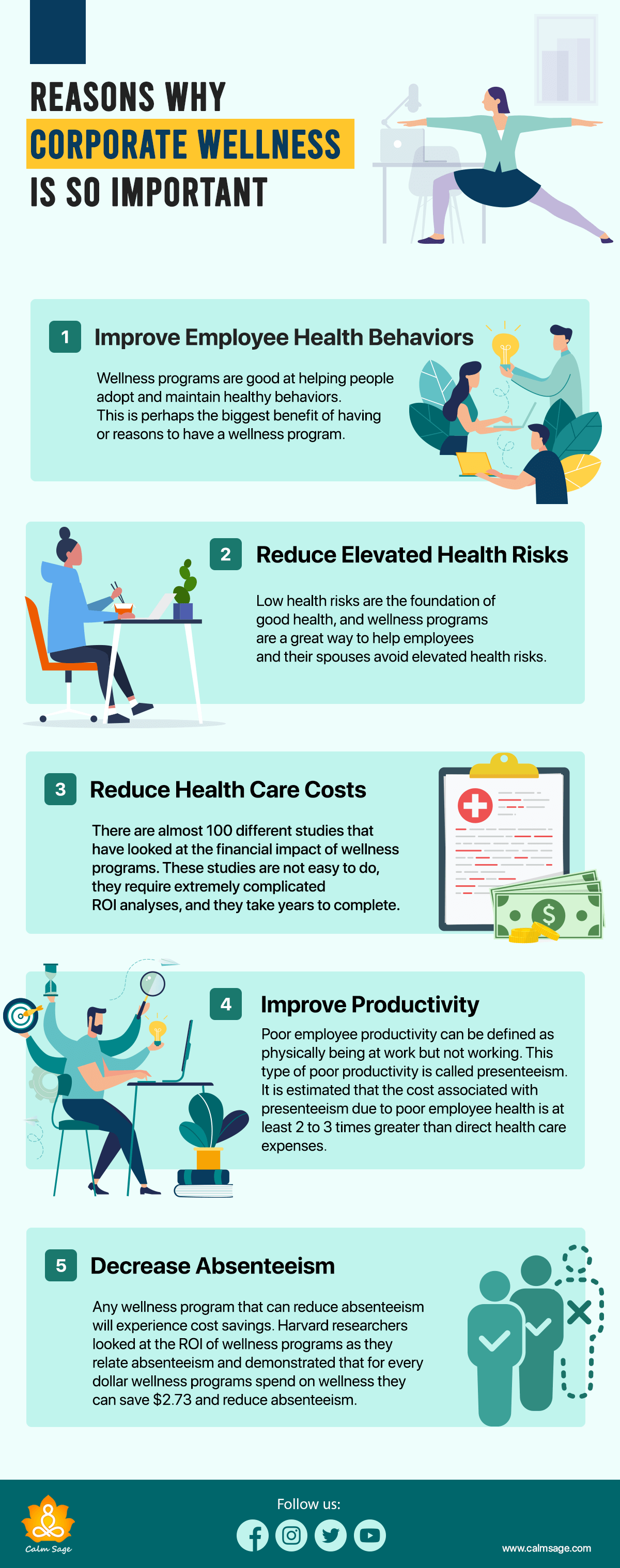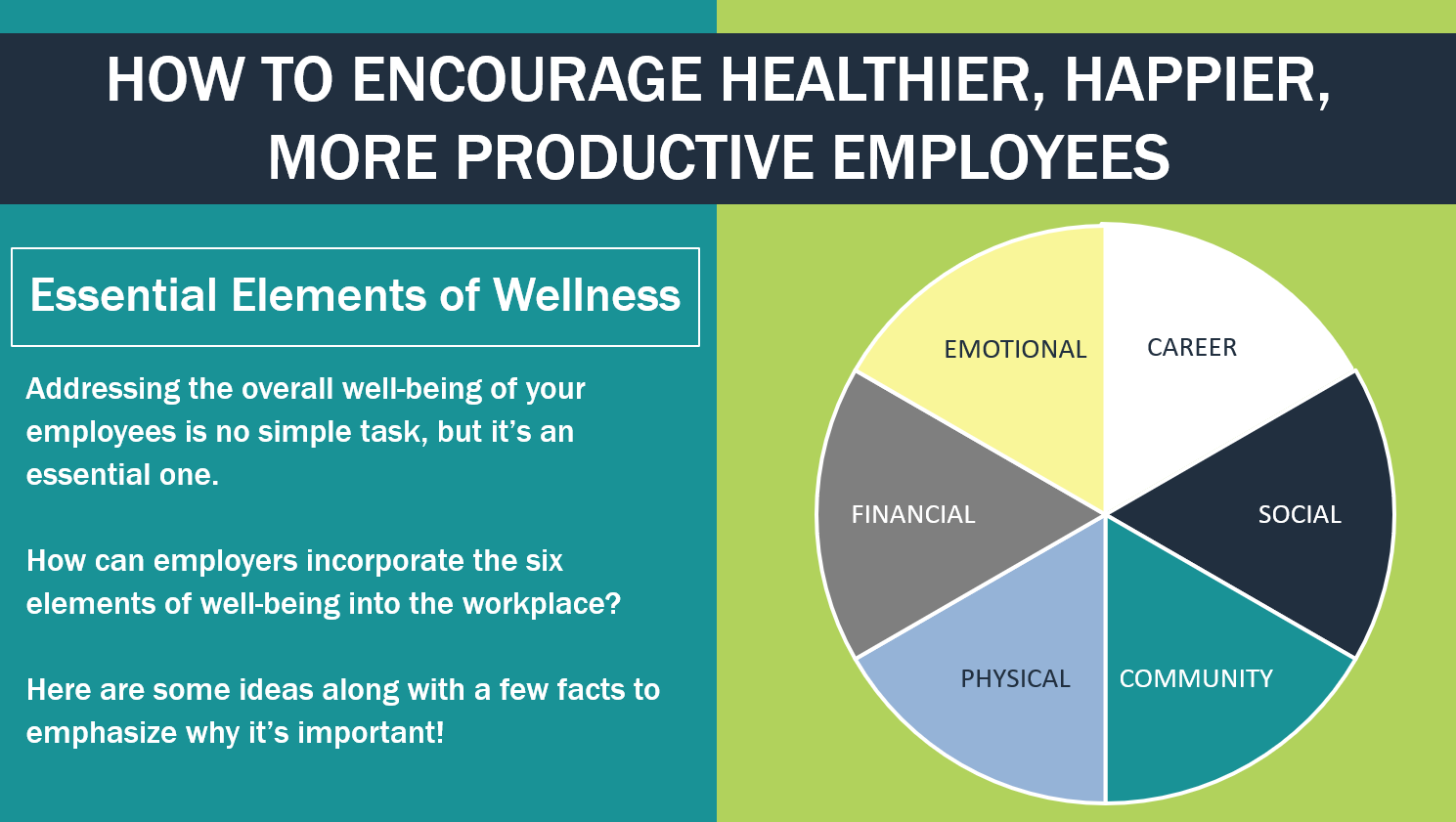What Does Corporate Wellness Mean?
What Does Corporate Wellness Mean?
Blog Article
Corporate Wellness for Beginners
Table of ContentsTop Guidelines Of Corporate Wellness10 Simple Techniques For Corporate WellnessThe smart Trick of Corporate Wellness That Nobody is Talking AboutThe 3-Minute Rule for Corporate WellnessNot known Facts About Corporate Wellness

Group Tests: Wellness 360 uses engaging team-based challenges that inspire workers. Data-Driven Decisions: considerable coverage and data analysis tools better notify your selections concerning worker health.

10 Simple Techniques For Corporate Wellness
Get in touch with the company to learn regarding strategies and pricing choices. 4.3/ 5 In today's dynamic workplace, focusing on employee well-being is no more a luxury; it's a need. These systems use attributes that address physical and psychological wellness needs, from personalized training and gamified challenges to data-driven insights and seamless advantage navigation.
Studies from Gallup show that firms with strong wellbeing efforts report an 81% decrease in absence, 18% higher performance, and 23% higher earnings. Below's why concentrating on worker wellbeing is clever organization: An encouraging work environment that values employee well-being fosters commitment and reduces turn over. Workers are more likely to stick with a business that sustains their wellness and individual lives.
Make sure employees have access to mental wellness experts via Employee Support Programs (EAPs). Employees prosper in settings where they really feel linked, sustained, and component of an area.
Arrange collective exercises, retreats, or gatherings to enhance connections. Set employees with coaches to cultivate expert growth and a feeling of belonging. Urge feedback and produce areas for significant conversations between staff members and leadership.: Financial tension can weaken both mental and physical health and wellness, causing reduced focus and efficiency at the office.
Things about Corporate Wellness
Encourage staff members to set borders, such as not responding to e-mails outside work hours. Minimal versatility in job plans, such as requiring on-site job, can include unnecessary tension and restriction employees' capability to manage personal obligations.
Mentorship programs sustain worker growth and boost the staff member experience. They create a culture of growth and support that contributes to both retention and satisfaction. An inclusive office ensures that all employees feel recognized and valued, adding to greater morale and involvement. Leaders should advertise inclusivity by modeling compassion and you can look here focusing on staff member wellness.
Contrast survey results over time to track adjustments in complete satisfaction and interaction. Usage insights from your metrics to improve your health and wellbeing efforts: If absenteeism continues to be high, you can check here take into consideration presenting more targeted health programs or revisiting work administration.
These examples highlight how firms can drive positive adjustment by spending in detailed wellbeing initiatives. Purchasing staff member health and wellbeing benefits both the labor force and the organization. By developing a helpful atmosphere, firms can influence workers to be a lot more engaged, resilient, and inspired. At IMD, our company believe that supporting wellness is integral to establishing reliable, caring leaders.
A Biased View of Corporate Wellness
Today, several companies do not see or can not determine the benefits of their current investments in employee health. They also don't allot resources in one of the most reliable wayoften, the issue is not just how much is being invested however the sort of investment being made. Instead than solely attending to the poor health of individual staff members, establishing a healthy labor force indicates taking a portfolio approach: addressing illness and promoting health, supporting individuals, and creating much healthier groups, work, and organizational settings.
The selection to demand a healthy and balanced workplace is one every employee and capitalist can make. Health is "greater than the absence of condition or infirmity," as the Globe Health And Wellness Organization (WHO) places it. Modern principles of wellness include mental, physical, spiritual, and social feature. Today, even more than 3.5 billion working grownups each spend roughly 90,000 hours (or regarding 45 years) of their lives at the workplace.
Several patterns are difficult to overlook: even more individuals working than ever before, an aging population living and working much longer, and rising levels of fatigue. The current state of the workforce, paired with these patterns, requires a rethink of employee health to avoid a prospective crisis for health and wellness and organization. A healthy and balanced workforce is not just an issue of company and societal responsibility; it is a calculated need and a substantial business opportunity.
The Best Strategy To Use For Corporate Wellness

This briefing explains why buying workforce wellness can increase organizational efficiency, boost worker results, and provide a substantial roi. The globe is changing. Corporate more information Wellness. Individuals are living and functioning longer, and their duties are advancing due to shifts in demography, breakthroughs in modern technology, globalization, and geopolitical and environment dangers
Report this page